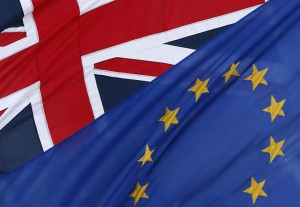 When I went to bed Thursday evening, the vote was close between the Remain and Leave sides in the hotly contest Brexit vote, but I didn’t think in my wildest dreams the Leave side would win. Although it was close, betting odds had the Remain side as the favourites. When I woke up Friday morning I expected to see that the Remain side surge ahead at the last moment and prevail; unfortunately, the polls got it wrong.
When I went to bed Thursday evening, the vote was close between the Remain and Leave sides in the hotly contest Brexit vote, but I didn’t think in my wildest dreams the Leave side would win. Although it was close, betting odds had the Remain side as the favourites. When I woke up Friday morning I expected to see that the Remain side surge ahead at the last moment and prevail; unfortunately, the polls got it wrong.
When I turned on the news and found out the Leave side had won, I almost fell out of my chair. I tried to pinch myself to wake up from this nightmare, but I wasn’t dreaming. In a historic vote, perhaps the biggest vote in the history of the UK, the British voted to leave the European Union (EU) by the narrowest of margins: 51.9 percent for the Leave side and 48.1 percent for the Remain side. (You’d think the Leave side would need at least a 60 percent of the vote for such an important decision, but I digress).
Economic and Political Turmoil Ensues
The surprising results set off a chain of both economic and political events. The British pound fell to its lowest level since 1985, the UK’s credit was downgraded and stock markets across the world plunged into a sea of red. If that wasn’t enough, on the political front, David Cameron resigned as prime minister of the UK, not to mention the many Labour Party resignations (and the likely vote of no coincidence in Jeremy Corbyn). This only adds more instability to a country apparently in the middle of a political revolution. The winds of change were strongly blowing, with some voters admitting to voting in favour of the Leave side just to scare the prime minister and send a strong message.
The problem is the message was too strong – the Leave side ended up winning. This left many voters in the Leave camp having second thoughts. For such an important vote, it seems many voters weren’t properly informed. The facts speak for themselves: the British were frantically Googling what the EU is hours after voting in favour of the Leave side.
The British are desperately seeking “a mulligan.” A petition for a second referendum created by someone on the Leave side has topped 3.6 million signatures. Unfortunately, David Cameron shot down any chance of a second referendum in parliament on Monday, saying the British must move forward with the decision they’ve made to bring some much-needed stability to the economy.
The Donald Trump of the UK: Boris Johnson
The Leave side appears to be caught off guard by its surprise victory over the Remain side. Boris Johnson, the face of the Leave side, a man often compared to Donald Trump, finds himself ill-prepared for the months that follow. Although the egotistical, outspoken Johnson would never admit it, he probably thought he had a snowball’s chance in hell of winning the referendum. He could have saved face by losing by a narrow margin and helped renegotiate a deal between the UK and the EU instead of being responsible for ejecting the UK from the EU.
The UK: A Nation Divided
To say the vote was polarizing would be an understatement to say the least. The vote pitted young against old, urban versus rural. Voter turnout was low for young voters (36 percent turnout for those between the ages of 18 and 24) compared to 83 percent for those 65 years or older. That being said, young voter, the the ones who will have to live with the UK’s decision to leave the EU the longest, voted in favour of remaining (66 percent voted to Remain). Meanwhile, older voters, tired of sending £350m to Brussels each week, bought in the xenophobic political rhetoric of Johnson (only 37 percent voted to Remain).
Be careful of unintended consequences. After Scotland voted to remain in the EU (62 percent Remain, 38 percent Leave), there’s new talk of a Scottish referendum. There’s a petition that has garnered over 100,000 signatures for London to declare its independence from the UK and remain in the EU. There’s even talked of Northern Ireland separating and rejoining Ireland.
The Brexit vote was supposed to bring the UK together, not tear it apart. The UK is more divided than ever. United Kingdom… it’s more liked the Divided Kingdom. With the Leave side coming out victorious, the biggest travesty is that British MP Jo Cox may have died in vain.
With the surprise exit of the UK from the EU, look for more economic and political instability at a time when we need the world’ s fifth largest economy (now the sixth largest after the Brexit vote) firing on all cylinders, not struggling to find its identity in the aftermath of the wounds it has self-inflected on itself and the world’s economy.
Sean Cooper is the bestselling author of the book, Burn Your Mortgage: The Simple, Powerful Path to Financial Freedom for Canadians, available now on Amazon and at Chapters, Indigo and major bookstores, and as an Audiobook on Amazon, Audible and iTunes.